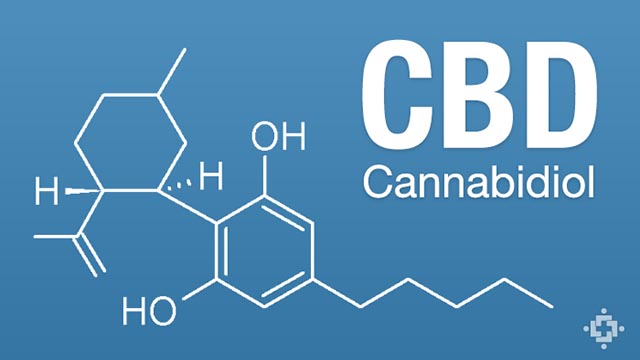Every cannabis smoker knows that the major psychoactive ingredient of the plant is Δ9-tetrahydrocannabinol (THC), but there is also a range of other chemicals in marijuana smoke. One of the other significant components is cannabidiol (CBD). Anecdotal evidence suggests that CBD can inhibit some negative side effects associated with marijuana, but does this claim stand up to scientific scrutiny?
THC is the major psychoactive component of marijuana smoke, but there is also a range of other chemicals present, cannabinoids for example. These chemicals interact with the cannabinoid receptors in the brain and more than 110 of them have been identified in cannabis plants. One of the most common cannabinoids is the cannabidiol that is often abbreviated as CBD. Actually the difference between various marijuana strains is the ratio of THC to CBD and to the other cannabinoids in the plant.
CBD is an antipsychotic, and as such, can counterbalance THC’s psychotic properties [1]. Therefore the ratio of these two components has a big impact on the psychological effect of marijuana. Traditionally, cannabis products contained about 5% THC and 3-4% CBD, but these percentages have changed dramatically over the past decades [2]. Nowadays, >15% THC is fairly common, while at the same time, the CBD content has been reduced to <1%. The high THC – low CBD strains are troubling, as evidence seems to suggest that THC is responsible for the mental health risks associated with heavy marijuana smoking. If this is the case, then modern high-THC strains would be much more prone to cause mental health troubles, compared to their counterparts from the 60’s.
Inspired by the potential public health implications, researchers from King’s College London examined whether treatment with CBD can really inhibit some of THC’s psychotic side effects [3]. A total of 48 participants were recruited between the age of 21-50. All of them had smoked cannabis previously, and they were free of mental illnesses. The experimental protocol was as follows. Participants were blindly given either a placebo or pills containing 600mg of CBD. They underwent a number of tests, examining both cognitive abilities (such as forward and reverse digit span test, symbol coding etc.) and psychotic state (specifically the Positive and negative symptoms scale (PANSS) and State social paranoia scale (SSPS) questionnaires). The first set of tests took about 3.5 hours, after which 1.5mg THC was administered intravenously. One hour after the injection (during which blood samples were collected) the participants completed the same set of tests and questionnaires as prior to the administration of THC.
The decrease in paranoia score did not attain statistical significance on the PANSS measure (an investigator-labelled scale), but did on the SPSS instrument (a participant-rated scale). It should be emphasised that CBD appears to reduce paranoia scores, but does not completely eliminate paranoid symptoms. Similarly, it was shown that CBD can reduce some of the THC-induced memory impairment, but was unable to eliminate it entirely. Specifically, on the Delayed recall test (retrieval of information after a fixed time delay) differences attained statistical significance, but not during the Immediate recall test. These somewhat mixed results highlight that we are just starting to grasp the complex effects of marijuana on cognition.
With marijuana legalisation sweeping through the USA, more and more research is being done on the plant. The attention of the medical community has now shifted away from THC to other cannabinoids components, such as CBD. This is an exciting new frontier, and this paper is a first step towards unravelling the complex modulatory effects of cannabidiol and other cannabinoids on the psychological effects of THC.
The results of this study support the initial hypothesis that CBD can reduce some of THC’s negative side effects. However some caution should be taken in how the results relate to smoking marijuana recreationally.
The paper highlights the advantage of administering THC intravenously, since in this way the drug can be supplied in precisely controlled quantities. On the other hand, the different route of administration also means that it is harder to relate the dosages in the study to those of recreational users, as the time varying plasma concentration will be different (i.e. the biologically-available amount of the drug) [4]. Furthermore, during the study, more than three hours elapsed between the CBD/placebo treatment and the THC administration. This time delay is absent in a recreational setting, where both substances are inhaled simultaneously. Last, but not least, participants were given 600 mg of CBD, a dose that is much higher than what is typically inhaled. Taken the different absorption rates into account this dose is roughly equivalent to smoking 2-3g of high CBD strains. This is based on a ‘back of the envelope’ calculation that is certainly oversimplified, but shows that the CBD dose is unrealistic.
These three factors, taken together, (different route of THC administration, unrealistically high CBD dose and the time delay between CBD and THC administration) mean that there are some reasons to question whether the results would translate to recreational use of marijuana (i.e. the results do not mean that smoking high CBD strains counterbalances the risk factors of THC). Only further experiments could settle that question.
SzB
References
[1]: Schubart, Christian D., et al. "Cannabis with high cannabidiol content is associated with fewer psychotic experiences." Schizophrenia research 130.1 (2011): 216-221.
[2]: Volkow, Nora D., et al. "Adverse health effects of marijuana use." New England Journal of Medicine 370.23 (2014): 2219-2227.
[3]: Englund, Amir, et al. "Cannabidiol inhibits THC-elicited paranoid symptoms and hippocampal-dependent memory impairment." Journal of Psychopharmacology 27.1 (2013): 19-27.
[4]: Nadulski, Thomas, et al. "Simultaneous and sensitive analysis of THC, 11-OH-THC,




